- Home
- Stephen R. Donaldson
The Power That Preserves t1cotc-3 Page 9
The Power That Preserves t1cotc-3 Read online
Page 9
The ur-viles were within arrow reach, but a line of red-eyed Cavewights bearing wooden shields protected them by intercepting the occasional shafts which Quaan’s warriors loosed from the windows of the tower. Behind this cover, the ur-viles were building.
They worked with deft speed, and their construction quickly took shape in their midst. Soon Mhoram saw that they were making a catapult.
Despite the freezing ire of Foul’s wind, his hands began to sweat on his staff. As the ur-viles looped heavy ropes around the sprocketed winches at the back of the machine, lashed the ropes to the stiff throwing-arm, and sealed with flashes of black power a large, ominous iron cup to the end of the arm, he found himself tensing, calling all his lore and strength into readiness. He knew instinctively that the attackers did not intend to hurl rocks at Revelstone.
The Demondim-spawn worked without instructions from Satansfist. He watched from a distance, but neither spoke nor moved. A score of them clambered over the catapult-adjusting, tightening, sealing it-and High Lord Mhoram marvelled grimly that they could build so well without eyes. But they showed no need for eyes; noses were as discerning as vision. In a short time the finished catapult stood erect before Revelstone’s tower.
Then barking shouts chorused through the encampment, and a hundred ur-viles ran forward to the machine. On either side, a score of them formed wedges to concentrate their power and placed themselves so that their loremasters stood at the winches. Using their iron staves, the two loremasters began turning the sprockets, thus tightening the ropes and slowly bending the catapult’s arm backward. The catapult dwarfed the creatures, but by focusing their strength in wedges, they were able to crank the winches and bend the arm. And while this was being done, the other ur-viles came together and made an immense wedge behind the catapult. Against the background of the frozen snow-scud, they looked like a spear point aimed at the heart of the Keep.
With part of his mind, Mhoram observed that Lord Amatin now stood beside him. He glanced around for Loerya and saw her on a balcony of the main Keep. He waved his approval to her; if any holocaust struck the watchtower, all the Lords would not be lost. Then he cocked an eyebrow at Quaan, and when the Warmark nodded to indicate that the warriors were ready for any sudden orders, High Lord Mhoram returned his attention to the ur-viles.
As the arm of the catapult was drawn back, Gravelingas Tohrm knelt at the parapet, spreading his arms and pressing his palms against the slow curve of the wall. In a dim, alien voice, he began to sing a song of granite endurance to the stone.
Then the arm reached its fullest arc. Quivering as if it were about to splinter, it strained toward the tower. At once, it was locked into place with iron hooks. Its wide cup had been brought down to chest level directly in front of the loremaster who apexed the largest wedge.
With a ringing clang, the loremaster struck its stave against the cup. Strength surged through scores of black shoulders; they emanated power as the loremaster laboured over the cup. And thick, cruel fluid, as fiery as the vitriol which consumes flesh and obsidian and teak alike, splashed coruscating darkly from the stave into the waiting cup.
The High Lord had seen human bodies fall into ash at the least touch of fluid like that. He turned to warn Quaan. But the old Warmark needed no warning; he also had watched warriors die in Demondim acid. Before Mhoram could speak, Quaan was shouting down the stairwell into the tower, ordering his warriors away from all the exposed windows and battlements.
At Mhoram’s side, Lord Amatin’s slight form began to shiver in the wind. She held her staff braced before her as if she were trying to ward the cold away.
Slowly, the loremaster’s fluid filled the cup. It splashed and spouted like black lava, throwing midnight sparks into the air; but the lore of the ur-viles contained it, held its dark force together, prevented it from shattering the catapult.
Then the cup was full.
The ur-viles did not hesitate. With a hoarse, hungry cry, they knocked free the restraining hooks.
The arm arced viciously forward, slapped with flat vehemence against the stop at the end of its throw.
A black gout of vitriol as large as a Stonedownor home sprang through the air and crashed against the tower a few dozen feet below the topmost parapet.
As the acid struck stone, it erupted. In lightless incandescence, it burned at the mountain rock like the flare of a dark sun. Tohrm cried out in pain, and the stone’s agony howled under Mhoram’s feet. He leaped forward. With Trevor and Amatin beside him, he called blue Lords-fire from his staff and flung it down against the vitriol.
Together, the three staffs flamed hotly to counter the acid. And because the ur-viles could not replenish it, it fell apart in moments-dropped like pieces of hate from the wall, and seared the ground before it was extinguished.
It left behind a long scar of corrosion in the stone. But it had not broken through the wall.
With a groan, Tohrm sagged away from the parapet. Sweat ran down his face, confusing his tears so that Mhoram could not tell whether the Gravelingas wept from pain or grief or rage. “Melenkurion abatha!” he cried thickly. “Ah, Revelstone!”
The ur-viles were already cranking their catapult into position for another throw.
For an instant, Mhoram felt stunned and helpless. With such catapults, so many thousands of ur-viles might be able to tear Lord’s Keep down piece by piece, reduce it to dead rubble. But then his instinct for resistance came to life within him. To Trevor and Amatin he snapped, “Those blasts must not touch the Keep. Join me. We will shape a Forbidding.”
Even as they moved away from him on either side to prepare between them as wide a defence as possible, he knew that these tactics would not suffice. Three Lords might be able to deflect the greatest harm of a few attacks, but they could not repulse the assault of fifteen or twenty thousand ur-viles. “Tohrm!” he commanded sharply. “Borillar!”
At once, Hearthrall Tohrm began calling for more Gravelingases. But Borillar hesitated, searching around him uncertainly as if the urgency of the Situation interfered with his thinking, hid his own lore from him.
“Calmly, Hirebrand,” Mhoram said to steady him. “The catapults are of wood.”
Abruptly, Borillar spun and dashed away. As he passed Warmark Quaan, he cried, “Archers!” Then he was yelling toward the main Keep, “Hirebrands! Bring lor-liarill! We will make arrows!
In a dangerously short time, the ur-viles had cocked their machine and were filling its cup with their black vitriol. They fired their next throw scant moments after Tohrm’s rhadhamaerl reinforcements had positioned themselves to support the stone.
At Mhoram’s command, the Lords struck against the arcing gout of acid before it reached the tower. Their staffs flashed as they threw up a wall of fire across the acid’s path.
The fluid hit their fire with a force which shredded their Forbidding. The black acid shot through their power to slam against the tower wall. But the attack had spent much of its virulence. When it reached the stone, Tohrm and his fellow Gravelingases were able to withstand it.
It shattered against the strength which they called up in the rock, and fell flaming viciously to the ground, leaving behind dark stains on the wall but no serious damage.
Tohrm turned to meet High Lord Mhoram’s gaze. Hot anger and exertion flushed the Hearthrall’s face, but he bared his teeth in a grin which promised much for the defence of Revelstone.
Then three of Quaan’s archers joined the Lords, followed closely by two Hirebrands. The archers were tall Woodhelvennin warriors, whose slimness of form belied the strength of their bows. Warmark Quaan acknowledged them, and asked Borillar what he wanted them to do. In response, Borillar accepted from the Hirebrands six long, thin arrows. These were delicately rune-carved, despite their slenderness; their tips were sharpened to keen points; and their ends were fletched with light brown feathers. The Hearthrall gave two of them to each archer, saying as he did so, “This is lor-liarill, the rare wood called by the Giants of Sear
each ‘Gildenlode.’ They-“
“We are Woodhelvennin,” the woman who led the archers said bluntly. ”Lor-liarill is known to us.”
“Loose them well,” returned Borillar. “There are no others prepared. Strike first at the Cavewights.”
The woman looked at Quaan to see if he had any orders for her, but he waved her and her companions to the parapet. With smooth competence, the three archers nocked arrows, bent bows, and took aim at the catapult.
Already, the ur-viles had pulled back its arm, and were busy rabidly refilling its iron cup.
Through his teeth, Quaan said, “Strike now.”
Together, three bowstrings thrummed.
Immediately, the defending Cavewights jerked up their shields, caught the arrows out of the air.
The instant the arrows bit wood, they exploded into flame. The force of their impact spread fire over the shields, threw blazing shreds and splinters down onto the Cavewights. Yelping in surprise and pain, the dull-witted, gangling creatures dropped their shields and jumped away from the fire.
At once, the archers struck again. Their shafts sped through the air and hit the catapult’s throwing arm, just below the cup. The lor-liarill detonated instantly, setting the black acid afire. In sudden conflagration, the fluid’s power smashed the catapult, scattered blazing wood in all directions. A score of ur-viles and several Cavewights fell, and the rest went scrambling beyond arrow range, leaving the pieces of the machine to burn themselves out.
With a fierce grin, the Woodhelvennin woman turned to Borillar and said, “The lillianrill make dour shafts, Hearthrall.”
Borillar strove to appear dispassionate, as if he were accustomed to such success, but he had to swallow twice before he could find his voice to say, “So it would appear.”
High Lord Mhoram placed a hand of praise on the Hearthrall’s shoulder. “Hirebrand, is there more lor-liarill which may be formed into such arrows?”
Borillar nodded like a veteran. “There is more. All the Gildenlode keels and rudders which were made for the Giants-before- That wood may be reshaped.”
“Ask the Hirebrands to begin at once,” said Mhoram quietly.
Smiling broadly, Tohrm moved to stand beside Borillar. “Hearthrall, you have outdone me,” he said in a teasing tone. “The rhadhamaerl will not rest until they have found a way to match this triumph of yours.”
At this, Borillar’s dispassion broke into a look of wide pleasure. Arm in arm, he and Tohrm left the tower, followed by the other Hirebrands and Gravelingases.
After bowing under a few curt words of praise from Quaan, the archers left also. He and the three Lords were left alone on the tower, gazing sombrely into each other’s eyes.
Finally, Quaan spoke the thought that was in all their faces. “It is a small victory. Larger catapults may strike from beyond the reach of arrows. Larger wedges may make power enough to breach the walls. If several catapults are brought to the attack together, we will be sorely pressed to resist even the first throws.”
“And the Illearth Stone has not yet spoken against us,” Mhoram murmured. He could still feel the force which had rent his defence tingling in his wrists and elbows. As an afterthought, he added, “Except in the voice of this cruel wind and winter.”
For a moment, he melded his mind with Trevor and Amatin, sharing his strength with them, and reminding them of their own resources. Then, with a sigh, Lord Amatin said, “I am of Woodhelvennin blood. I will assist Hearthrall Borillar in the making of these shafts. It will be slow work, and many of the lillianrill have other tasks.”
“And I will go to Tohrm,” Trevor said. “I have no lore to match the rhadhamaerl. But it may be that a counter to this Demondim-bane can be found in the fire-stones.”
Mhoram approved silently, put his arm around the two Lords and hugged them. “I will stand watch,” he said, “and summon Loerya when I am weary.” Then he sent Quaan with them from the tower, so that the Warmark could ready his warriors for all the work they might have to do if the walls were harmed. Alone, the High Lord stood and faced the dark encampment of Satansfist’s hordes — stood below the snapping Furl, which was already ragged in the sharp wind, planted the iron heel of his staff on the stone, and faced the encircling enemy as if his were the hand which held the outcome of the siege.
In the grey dimness toward evening, the ur-viles built another catapult. Beyond the reach of arrows, they constructed a stronger machine, one capable of throwing their power across the additional ground. But High Lord Mhoram summoned no aid. When the black spew of corrosion was launched, it had farther to travel; it was beyond the command of its makers for a longer time. Mhoram’s blue power lashed out at it as it reached the top of its arc. A fervid lightning of Lords-fire bolted into the vitriol, weakened its momentum, caused it to fall short. Splashing angrily, effectlessly, it crashed to the earth, and burned a morbid hole like a charnel pit in the frozen dirt.
The ur-viles withdrew, returned to the garish watch fires which burned throughout the army for the sake of the misborn creatures that needed light. After a time, Mhoram rubbed the strain from his forehead, and called Lord Loerya to take his place.
During the blind night, three more catapults were built in the safety of distance, then brought forward to attack Revelstone. None of them assaulted the tower; two of them threw at the walls of the main Keep from the north, one from the south. But each time the defenders were able to react quickly. The loremasters’ exertion of power as they cocked the machines radiated a palpable impression up at the battlements, and this emanation warned the Keep of each new assault. Archers waiting with lor-liarill arrows raced to respond.
They gained light to aim with by driving arrows into the ground near the catapults; in the sudden revealing fires, they destroyed two of the new threats as they had destroyed the first. But the third remained beyond bowshot, and attacked the south wall from a position out of Loerya’s reach. Yet this assault was defeated also. In a moment of inspiration, the Haft commanding the archers ordered them to direct their shafts at the acid as it arced toward the Keep. The archers fired a dozen shafts in rapid succession into the gout of fluid, and succeeded in breaking it apart, so that it spattered against the stone in weaker pieces and did little harm.
Fortunately, there were no more attacks that night. All the new Gildenlode arrows had been used, and the process of making more was slow and difficult. Throughout the next day also there were no attacks, though the sentries could see ur-viles building catapults in the distance. No move was made against Revelstone until deep in the chattering darkness of midnight. Then alarms rang through the Keep, calling all its defenders from their work or rest. In the wind-torn light of arrows aflame like torches in the frozen earth, the Lords and Hirebrands and Gravelingases and warriors and Lorewardens saw ten catapults being cranked into position beyond the range of the archers.
Orders hummed through the stone of the Keep. Men and women dashed to take their places. In moments, a Lord or a team of defenders stood opposite each catapult. As the cups were filled, Revelstone braced itself for the onslaught of power.
At the flash of a dank green signal from Satansfist, the ten catapults threw.
The defence outlined Revelstone in light, cast so much bright orange, yellow, and blue fire from the walls that the whole plateau blazed in the darkness like a conflagration of defiance. Working together from the tower, Mhoram and Amatin threw bolts of power which cast down two of the vitriol attacks. From the plateau atop Revelstone, the Lords Trevor and Loerya used their advantage of height to help them each deflect one cupful of corrosion into the ground.
Two of the remaining attacks were torn apart by Hearthrall Borillar’s arrows. Using a piece of orcrest given to them by Hearthrall Tohrm, and a lomillialor rod obtained from Lord Amatin, teams of Lorewardens erected barriers which consumed most of the virulence in two assaults, prevented them from doing any irrecoverable damage.
Gravelingases met the last two throws of the ur-viles. With one par
tner, Tohrm had positioned himself on a balcony directly in front of one catapult. They stood on either side of a stone vat of graveling, and sang a deep rhadhamaerl song which slowly brought their mortal flesh into harmony with the mounting radiance of the fire-stones. While the ur-viles filled the cup of the machine, Tohrm and his companion thrust their arms into the graveling, pushed their lore-preserved hands deep among the fire-stones near the sides of the vat. There they waited in the golden heat, singing their earthish song until the catapult threw and the vitriol sprang toward them.
In the last instant, they heaved a double armful of graveling up at the black gout. The two powers collided scant feet above their heads, and the force of the impact knocked them flat on the balcony. The wet corrosion of the acid turned the graveling instantly to cinders, but in turn the rhadhamaerl might of the fire-stones burned away the acid before the last drop of it touched Tohrm or Revelstone.
The other pair of Gravelingases were not so successful. They mistimed their countering heave, and as a result their graveling only stopped half the vitriol. Both men died in fluid fire which destroyed a wide section of the balcony.
But instead of striking again, launching more attacks to wear down the defences of the Keep, the ur-viles abandoned their catapults and withdrew-apparently satisfied with what they had learned about Revelstone’s mettle.
High Lord Mhoram watched them go with surprise in his face and cold dread in his heart. Surely the ur-viles had not been intimidated by the defence. If Satansfist chose now to change his tactics, it was because he had measured the weakness of Revelstone, and knew a better way to capitalize on it.

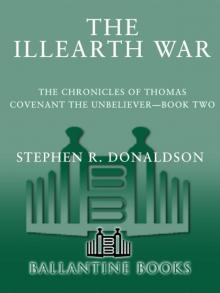 The Illearth War
The Illearth War Last Chronicles of Thomas Covenant 02 - Fatal Revenant
Last Chronicles of Thomas Covenant 02 - Fatal Revenant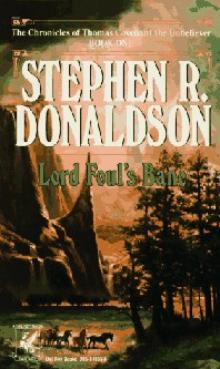 Lord Foul's Bane
Lord Foul's Bane The Gap Into Ruin: This Day All Gods Die
The Gap Into Ruin: This Day All Gods Die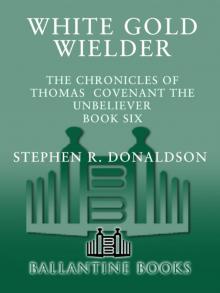 White Gold Wielder
White Gold Wielder Fatal Revenant
Fatal Revenant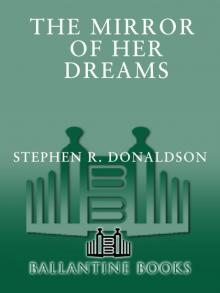 The Mirror of Her Dreams
The Mirror of Her Dreams Against All Things Ending
Against All Things Ending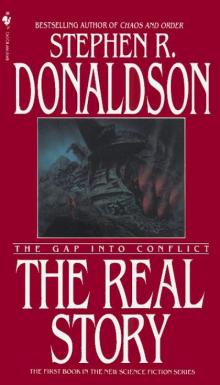 The Real Story: The Gap Into Conflict
The Real Story: The Gap Into Conflict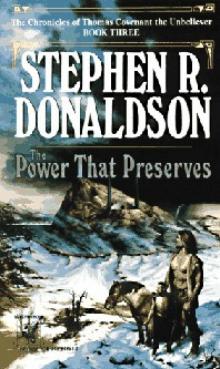 The Power That Preserves
The Power That Preserves Seventh Decimate
Seventh Decimate The Gap Into Power: A Dark and Hungry God Arises
The Gap Into Power: A Dark and Hungry God Arises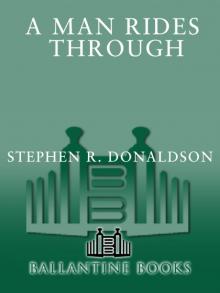 A Man Rides Through
A Man Rides Through The Gap Into Vision: Forbidden Knowledge
The Gap Into Vision: Forbidden Knowledge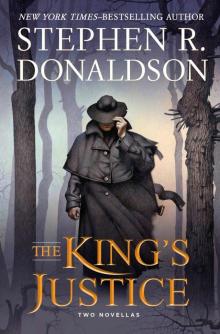 The King's Justice: Two Novellas
The King's Justice: Two Novellas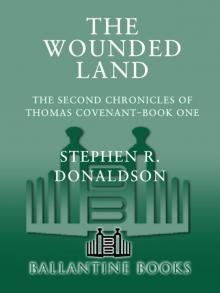 The Wounded Land
The Wounded Land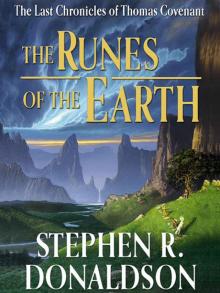 The Runes of the Earth
The Runes of the Earth Mordant's Need
Mordant's Need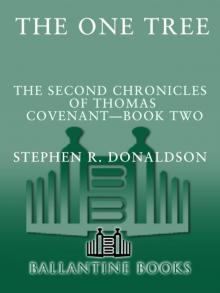 The One Tree
The One Tree Gilden-Fire
Gilden-Fire Reave the Just and Other Tales
Reave the Just and Other Tales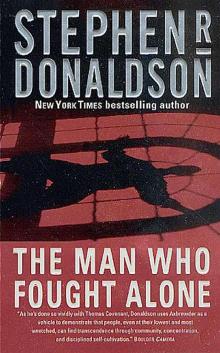 The Man Who Fought Alone
The Man Who Fought Alone The Last Dark
The Last Dark The Man Who Tried to Get Away
The Man Who Tried to Get Away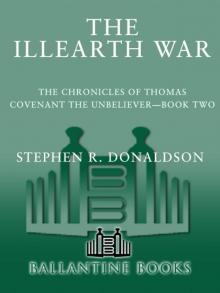 Thomas Covenant 02: The Illearth War
Thomas Covenant 02: The Illearth War A Dark and Hungry God Arises
A Dark and Hungry God Arises The One Tree t2cotc-2
The One Tree t2cotc-2 Lord Foul's Bane cotc-1
Lord Foul's Bane cotc-1 The Illearth War t1cotc-2
The Illearth War t1cotc-2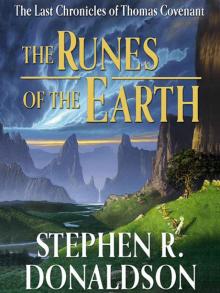 The Runes of the Earth: The Last Chronicles of Thomas Covenant - Book One
The Runes of the Earth: The Last Chronicles of Thomas Covenant - Book One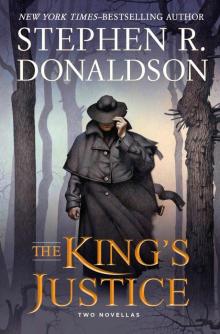 The King's Justice
The King's Justice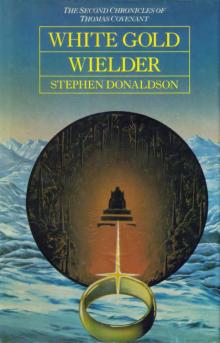 White Gold Wielder t2cotc-3
White Gold Wielder t2cotc-3 The Power That Preserves t1cotc-3
The Power That Preserves t1cotc-3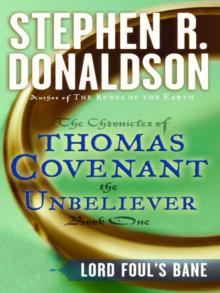 Thomas Covenant 01: Lord Foul's Bane
Thomas Covenant 01: Lord Foul's Bane Chaos and Order: The Gap Into Madness
Chaos and Order: The Gap Into Madness Daughter of Regals
Daughter of Regals Forbidden Knowledge: The Gap Into Vision
Forbidden Knowledge: The Gap Into Vision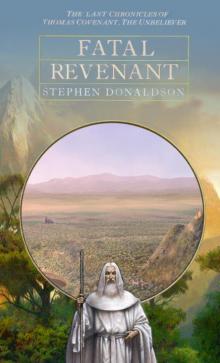 Fatal Revenant t3cotc-2
Fatal Revenant t3cotc-2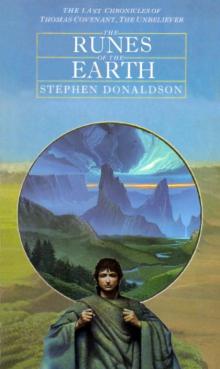 The Runes of the Earth t3cotc-1
The Runes of the Earth t3cotc-1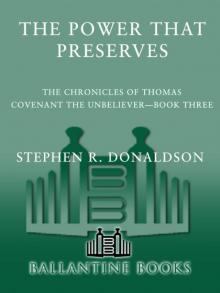 Thomas Covenant 03: Power That Preserves
Thomas Covenant 03: Power That Preserves This Day all Gods Die: The Gap into Ruin
This Day all Gods Die: The Gap into Ruin The Wounded Land t2cotc-1
The Wounded Land t2cotc-1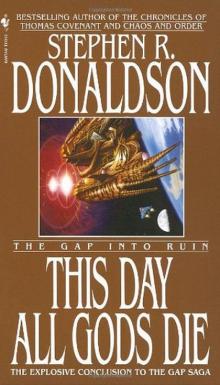 This Day All Gods Die
This Day All Gods Die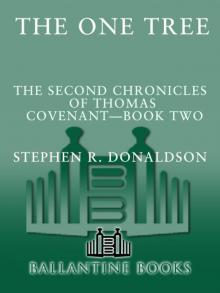 One Tree
One Tree